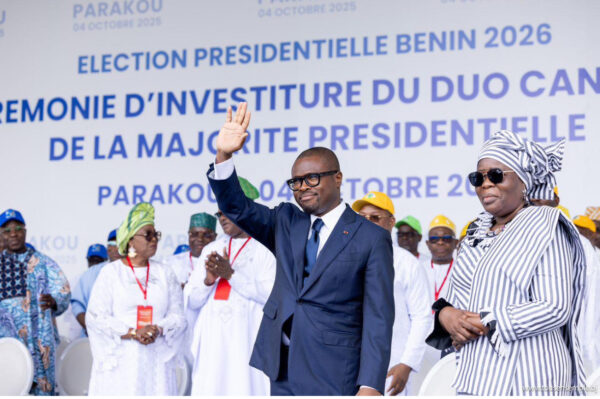Parakou resonated this Saturday with songs and cheers from supporters who came to witness the inauguration of the presidential duo supported by the movement. Amidst the enthusiastic applause, Romuald Wadagni was officially designated as a candidate, alongside Mariam Chabi Talata, the current Vice President of the Republic.
From the first minutes of his speech, the tone was marked by his sincerity and personal connection. The current Minister of Economy and Finance, sometimes perceived as a reserved technocrat, chose to share his story, recalling his childhood memories in the city of Kobourou:
“As a child, I accompanied my father, who was then the departmental director of the Plan du Borgou. The roads were long, often in poor condition, sometimes impassable. In a vehicle commonly called a ‘404 bâchée,’ which often needed to be pushed to start, we had to change a tire almost every trip.”
He added, with emotion:
“As you can imagine, I was often my father’s travel companion, and you can therefore guess my great emotion this morning, traveling alone on this road to come here, to this city that also saw me grow up.”
These words, simple and heartfelt, struck a chord among the supporters. Several of them, interviewed at the end of the ceremony, said they had discovered “another Wadagni”: not just the successful minister, praised for the country’s financial stability, but a man connected to his roots and the everyday life of the Beninese people.
Born in Lokossa in 1976, Romuald Wadagni had a childhood far from the power circles of Cotonou. His father, Nestor Wadagni, a doctor in mathematics, instilled in him rigor and a sense of public service; his mother, an entrepreneur, taught him the taste for risk and the value of hard work. As a teenager, he spent his holidays learning manual trades and participating in the fieldwork of his grandparents.
This austere education, combined with twenty years of practicing judo, shaped a temperament of consistency and discipline. It is this same determination that is recognized in his management of public affairs: rigor, method, and a demand for results.
The inauguration ceremony also highlighted the idea of continuity and unity. The four parties of the movement – Renaissance Nationale, Moele Bénin, Bloc Républicain, and Union Progressiste le Renouveau – joined forces to support his candidacy. Wadagni took the opportunity to salute their leaders, emphasizing that “this inauguration is not only that of a man, a woman, or a political camp. It is a moment that belongs to the entire Beninese Nation.”
In Parakou this Saturday, the audience not only applauded the brilliant technician. They rediscovered a man of conviction and closeness. Behind the minister’s suit, the local child revealed himself – humble, rooted, and ready to write a new page in national history.


